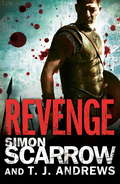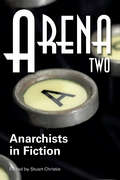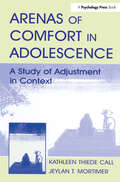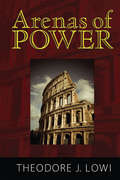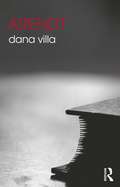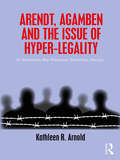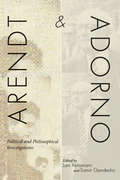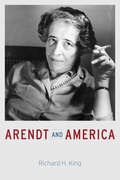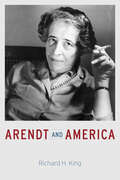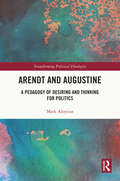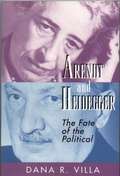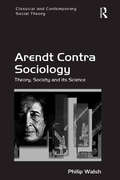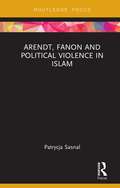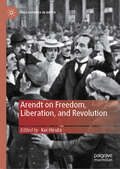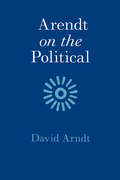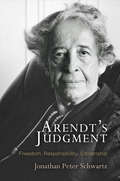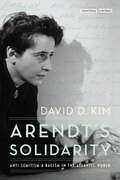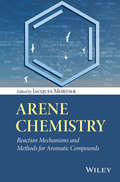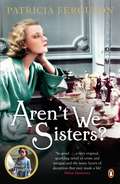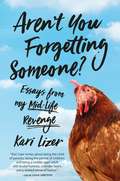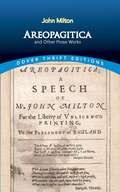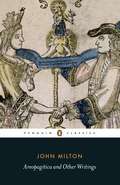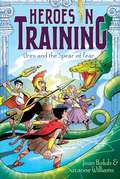- Table View
- List View
Arena: Revenge (Roman Arena #4)
by Simon Scarrow T. J. AndrewsThe opening day of the Games in Rome is a time for celebration in honour of the new Emperor. But for Marcus Valerius Pavo, a young military tribune fallen from grace, only despair awaits. Along with former mentor, Optio Macro, Pavo must fight for his life in a ferocious beast hunt. Battling against lions and bears, he'll have to use all his wits to survive, as well as the help of a hated former rival. But when Pavo achieves a stunning victory, his reward is to be condemned to death in a chaotic free-for-all. Now the young gladiator faces a race against time to triumph over the odds, save his son - and exact the ultimate revenge over the Emperor...(P)2018 Headline Publishing Group Ltd
Arena: Revenge (Part Four of the Roman Arena Series)
by Simon Scarrow T. J. AndrewsThe opening day of the Games in Rome is a time for celebration in honour of the new Emperor. But for Marcus Valerius Pavo, a young military tribune fallen from grace, only despair awaits. Along with former mentor, Optio Macro, Pavo must fight for his life in a ferocious beast hunt. Battling against lions and bears, he'll have to use all his wits to survive, as well as the help of a hated former rival. But when Pavo achieves a stunning victory, his reward is to be condemned to death in a chaotic free-for-all. Now the young gladiator faces a race against time to triumph over the odds, save his son - and exact the ultimate revenge over the Emperor...
Arena Two: Noir Fiction (Arena Journal)
by Stuart ChristieTapping into the rich seam of anarchist and libertarian currents in noir fiction, this collection of essays explores fictional atmospheres that are dark and sinister—but not without hope. The protagonists of these works are often profoundly flawed but have something of the romantic optimist about them—men and women driven to face moral challenges and to do battle with the forces of evil or banality. Among the authors discussed are Stig Dagerman, Andre Helena, Leo Malet, George Navel, Jean-Marc Raynaud, Leda Rafanelli, B. Traven, and Simone Weil. Also included are an analysis by Agustin Guillamon of Miguel Mir's Entre El Roig I El Negre, Massimo Ortalli's discussion of The Regeneration of an Anarchist, and essays by Simon Watson Taylor and Stephen Schwartz on the relationship between surrealism and anarchism.
Arenas of Comfort in Adolescence: A Study of Adjustment in Context (Research Monographs in Adolescence Series)
by Jeylan T. Mortimer Kathleen T. CallAdolescence is a time when the social world expands, a time of increasing engagement beyond the family sphere to the school, the peer group, and the workplace. These contexts may present experiences that differ greatly in their tone and content, either contributing to or hindering satisfaction and a positive sense of self. This book examines how the constellation of stressors and rewards in various life domains influences adolescent adjustment. The theoretical framework is Simmons' "arena of comfort": a context for individuals to relax and to rejuvenate, so that potentially stressful changes and experiences in another arena can be endured or mastered. The concept of the arena of comfort highlights the adolescent's active role in the developmental process, as young people seek out and alternate between contexts that provide challenge and those that provide solace. By providing social support, a comfort arena strengthens the young person so that challenges in other life spheres can be dealt with. This book uses data from 1,000 adolescents to address key questions derived from the "arena of comfort" thesis: In which arenas of their lives do adolescents typically find comfort? Does the experience of comfort differ by gender, socioeconomic level, and other dimensions of social background? Do sources of comfort change as the adolescent moves through high school? Do adolescents typically find comfort in just one or two or in several arenas? Where are they most likely to experience this positive, comfortable state? Are adolescents who find comfort in a greater number of arenas better off, in terms of their mental health and achievement, than those who are comfortable in fewer contexts? Are some arenas more consequential for adolescent adjustment than others? Can an arena of comfort in one setting, in fact, buffer the effects of stressful experiences in another context? The results of this research indicate that making adolescents' contexts more supportive and comfortable will be reflected in improved mental health and achievement. This book will be of interest to all practitioners and researchers concerned with the mental health of adolescents.
Arenas of Power: Reflections on Politics and Policy
by Theodore J. Lowi Norman K. NicholsonArenas of Power represents the first time that Theodore J. Lowi's model of policy analysis has been presented together with key applications and case studies drawn from his long history of scholarship-all in one place. Lowi's signature four-fold typology is shown as conceived and then as extended to include that most relevant of contemporary phenomena-"social regulatory policy." As Lowi says, when radicals add morality to the goals of public policy, the system may be turned on its head. This volume shows the evolution of the public policy arena over more than forty years of writing and thinking and presents some never before published material including helpful analytical introductions. The book concludes as Lowi looks ahead to an internationalizing U.S. political economy and the need for a global political science.
Arendt: The Fate Of The Political (The Routledge Philosophers)
by Dana VillaHannah Arendt (1906–1975) was a philosopher and political theorist of astonishing range and originality and one of the leading thinkers of the twentieth century. A former student of Martin Heidegger and Karl Jaspers, she fled Nazi Germany to Paris in 1933, and subsequently escaped from Vichy France to New York in 1941. The Origins of Totalitarianism (1951) made her famous. After visiting professorships at Princeton, Berkeley, and the University of Chicago, she took up a permanent position at the New School in 1967. Renowned for The Human Condition, On Revolution, and The Life of the Mind, she is also known for her brilliant but controversial reporting and analysis of Adolf Eichmann’s 1961 trial in Jerusalem—an experience that led to her to coin the phrase "the banality of evil." In this outstanding introduction to Arendt's thought Dana Villa begins with a helpful overview of Arendt's life and intellectual development, before examining and assessing the following important topics: Arendt's analysis of the nature of political evil and the arguments of The Origins of Totalitarianism political freedom and political action and the arguments of On the Human Condition, especially Arendt's return to the ancient Greek polis and her critique of modernity modernity and revolution and Arendt's text On Revolution responsibility and judgment and her reporting of the Eichmann trial Arendt's view of contemplation and the fundamental faculties of mental life Arendt's rich legacy and influence, including her civic republican understanding of freedom and her influence on the Frankfurt School, communitarianism, and democratic theory. Including a chronology, chapter summaries, and suggestions for further reading, this indispensable guide to Arendt's philosophy will also be useful to those in related disciplines such as politics, sociology, history, and economics.
Arendt, Agamben and the Issue of Hyper-Legality: In Between the Prisoner-Stateless Nexus
by Kathleen R. ArnoldIn the Origins of Totalitarianism, Hannah Arendt famously argued that the stateless were so rightless, that it was better to be a criminal who at least had some rights and protections. In this book, Kathleen R. Arnold examines Arendt’s comparison in the context of post-1996 U.S. criminal and immigration policies, arguing that the criminal-stateless binary is significant to contemporary politics and yet flawed. A key distinction made today is that immigrant detention is not imprisonment because it is a civil system. In turn, prisoners are still citizens in some respects but have relatively few rights since the legal underpinnings of "cruel and unusual" have shifted in recent times. The two systems – immigrant detention and the prison system – are also concretely related as they often house both populations and utilize the same techniques (such as administrative segregation). Arnold compellingly argues that prisoners are essentially made into foreigners in these spaces, while immigrants in detention are cast as outlaws. Examining legal theory, political theory and discussing specific cases to illustrate her claims, Arendt, Agamben and the Issue of Hyper-Legality operates on three levels to expose the degree to which prisoners’ rights have been suspended and how immigrant policy and detention cast foreigners as inherently criminal. Less talked about, the government in turn expands sovereign, discretionary power and secrecy at the expense of openness, transparency and democratic community. This book will be of interest to scholars and students of contemporary political theory, philosophy and law, immigration, and incarceration.
Arendt and Adorno: Political and Philosophical Investigations
by Lars Rensmann Samir GandeshaHannah Arendt and Theodor W. Adorno, two of the most influential political philosophers and theorists of the twentieth century, were contemporaries with similar interests, backgrounds, and a shared experience of exile. Yet until now, no book has brought them together. In this first comparative study of their work, leading scholars discuss divergences, disclose surprising affinities, and find common ground between the two thinkers. This pioneering work recovers the relevance of Arendt and Adorno for contemporary political theory and philosophy and lays the foundation for a critical understanding of political modernity: from universalistic claims for political freedom to the abyss of genocidal politics.
Arendt and America
by Richard H. KingGerman-Jewish political philosopher Hannah Arendt (1906-75) fled from the Nazis to New York in 1941, and during the next thirty years in America she wrote her best-known and most influential works, such as The Human Condition, The Origins of Totalitarianism, and On Revolution. Yet, despite the fact that a substantial portion of her oeuvre was written in America, not Europe, no one has directly considered the influence of America on her thought--until now. In Arendt and America, historian Richard H. King argues that while all of Arendt's work was haunted by her experience of totalitarianism, it was only in her adopted homeland that she was able to formulate the idea of the modern republic as an alternative to totalitarian rule. Situating Arendt within the context of U. S. intellectual, political, and social history, King reveals how Arendt developed a fascination with the political thought of the Founding Fathers. King also re-creates her intellectual exchanges with American friends and colleagues, such as Dwight Macdonald and Mary McCarthy, and shows how her lively correspondence with sociologist David Riesman helped her understand modern American culture and society. In the last section of Arendt and America, King sets out the context in which the Eichmann controversy took place and follows the debate about "the banality of evil" that has continued ever since. As King shows, Arendt's work, regardless of focus, was shaped by postwar American thought, culture, and politics, including the Civil Rights Movement and the Cold War. For Arendt, the United States was much more than a refuge from Nazi Germany; it was a stimulus to rethink the political, ethical, and historical traditions of human culture. This authoritative combination of intellectual history and biography offers a unique approach for thinking about the influence of America on Arendt's ideas and also the effect of her ideas on American thought.
Arendt and America
by Richard H. KingGerman-Jewish political philosopher Hannah Arendt (1906–75) fled from the Nazis to New York in 1941, and during the next thirty years in America she wrote her best-known and most influential works, such as The Human Condition, The Origins of Totalitarianism, and On Revolution. Yet, despite the fact that a substantial portion of her oeuvre was written in America, not Europe, no one has directly considered the influence of America on her thought—until now. In Arendt and America, historian Richard H. King argues that while all of Arendt’s work was haunted by her experience of totalitarianism, it was only in her adopted homeland that she was able to formulate the idea of the modern republic as an alternative to totalitarian rule. Situating Arendt within the context of U.S. intellectual, political, and social history, King reveals how Arendt developed a fascination with the political thought of the Founding Fathers. King also re-creates her intellectual exchanges with American friends and colleagues, such as Dwight Macdonald and Mary McCarthy, and shows how her lively correspondence with sociologist David Riesman helped her understand modern American culture and society. In the last section of Arendt and America, King sets out the context in which the Eichmann controversy took place and follows the debate about “the banality of evil” that has continued ever since. As King shows, Arendt’s work, regardless of focus, was shaped by postwar American thought, culture, and politics, including the Civil Rights Movement and the Cold War. For Arendt, the United States was much more than a refuge from Nazi Germany; it was a stimulus to rethink the political, ethical, and historical traditions of human culture. This authoritative combination of intellectual history and biography offers a unique approach for thinking about the influence of America on Arendt’s ideas and also the effect of her ideas on American thought.
Arendt and Augustine: A Pedagogy of Desiring and Thinking for Politics (Transforming Political Theologies)
by Mark AloysiusThis book addresses a lacuna in scholarship concerning Hannah Arendt’s Augustinian heritage that has predominantly focused on her early work. It de-canonises the sources that political theology has appealed to by shifting the interpretive focus to her mature treatment in The Life of the Mind. Arendt’s initial criticism of Augustinian desiring is that it generates 'worldlessness'. In her later works, Arendt develops a more nuanced reading of the movements of thinking, desiring, and loving in her engagement with Augustine. This study attends to these movements and inspects the spatio-temporal framework which structure Arendt’s conception of the political. The author assesses the claim that Arendt’s conception of the political is drawn from a pedagogy of desiring and thinking from Augustine severed from his mystagogy. Although respecting the method of political theory, the author contends that Arendt’s severing of Augustinian pedagogy from mystagogy brings her to an insurmountable aporia. Instead, the author embeds these pedagogical practices within Augustine’s theology and suggests how that aporia might be overcome and used to develop a mystagogy for contemporary political life. The book will be of particular interest to scholars of political theology, as well as political theory, and political philosophy.
Arendt and Heidegger: The Fate of the Political
by Dana VillaTheodor Adorno once wrote an essay to "defend Bach against his devotees." In this book Dana Villa does the same for Hannah Arendt, whose sweeping reconceptualization of the nature and value of political action, he argues, has been covered over and domesticated by admirers (including critical theorists, communitarians, and participatory democrats) who had hoped to enlist her in their less radical philosophical or political projects. Against the prevailing "Aristotelian" interpretation of her work, Villa explores Arendt's modernity, and indeed her postmodernity, through the Heideggerian and Nietzschean theme of a break with tradition at the closure of metaphysics. Villa's book, however, is much more than a mere correction of misinterpretations of a major thinker's work. Rather, he makes a persuasive case for Arendt as the postmodern or postmetaphysical political theorist, the first political theorist to think through the nature of political action after Nietzsche's exposition of the death of God (i.e., the collapse of objective correlates to our ideals, ends, and purposes). After giving an account of Arendt's theory of action and Heidegger's influence on it, Villa shows how Arendt did justice to the Heideggerian and Nietzschean criticism of the metaphysical tradition while avoiding the political conclusions they drew from their critiques. The result is a wide-ranging discussion not only of Arendt and Heidegger, but of Aristotle, Kant, Nietzsche, Habermas, and the entire question of politics after metaphysics.
Arendt Contra Sociology: Theory, Society and its Science (Classical And Contemporary Social Theory Ser.)
by Philip WalshHannah Arendt is today widely regarded today as a political theorist, who sought to rescue politics from society, and political theory from the social sciences. But this view has had the effect of distracting attention from many of Arendt's most important insights concerning the constitution of society, and the significance of its 'science', sociology. Arendt Contra Sociology re-assesses the relationship between Arendt's work and the theoretical foundations of sociology, bringing her insights to bear on some key themes within contemporary theoretical sociology. Re-reading Arendt's distinctions between labour, fabrication and action as a theory of the fundamental ontology of human societies, this book assesses her criticism of the tendency of many sociological paradigms to conflate the activity of fabrication with that of action. It re-examines Arendt's understanding of central areas of research within contemporary theoretical sociology - including the meaning of power, the trajectory of modern science, the rise of consumerism and the problem of reflexivity. This volume offers a comprehensive reconstruction of Arendt's thought, uncovering its refutation of, or latent contribution to, key sociological approaches. It will be of interest to sociologists, social and political theorists and philosophers of social science.
Arendt, Fanon and Political Violence in Islam (Routledge Research on Decoloniality and New Postcolonialisms)
by Patrycja SasnalThis book looks at contemporary political violence, in the form of jihadism, through the lens of a philosophical polemic between Hannah Arendt and Frantz Fanon: intellectual representatives of the global north and global south. It explores the relationship of Arendt’s thought, mostly as expressed in On Violence (1969), to Fanon’s The Wretched of the Earth (1961) and the transposition of that relationship to the contemporary phenomenon of violent Islamic extremism. The book reveals a greater commonality between Fanon and Arendt as well as the universal function of jihadism that satisfies the conditions for political violence, as categorized by Fanon in the global south and Arendt in the global north. Read in tandem, Arendt and Fanon help uncover the fundamental problems of our European, American, Middle Eastern and African political systems as well as north-south relations. By studying political theory, the book finds global political commonalities in a postcolonial reality. Written in an accessible style, this book will be of great interest to undergraduates and graduates in philosophy, political sciences and international relations (IR), sociology and Middle Eastern studies as well as scholars and professionals interested in radicalization; violent extremism; and the foreign policies of European, Middle Eastern and African countries.
Arendt on Freedom, Liberation, and Revolution (Philosophers in Depth)
by Kei HirutaThis edited volume focuses on what Hannah Arendt famously called “the raison d’être of politics”: freedom. The unique collection of essays clarifies her flagship idea of political freedom in relation to other key Arendtian themes such as liberation, revolution, civil disobedience, and the right to have rights. In addressing these, contributors to this volume juxtapose Arendt with a number of thinkers from Isaiah Berlin, John Rawls and Philip Pettit to Karl Marx, Frantz Fanon and Geoffroy de Lagasnerie. They also consider the continuing relevance of Arendt’s work to some of the most dramatic events in recent years, including the current global refugee crisis, the Arab uprisings of the 2010s, and the ongoing crisis of liberal democracy in the West and beyond. Contributors include Keith Breen, Joan Cocks, Tal Correm, Christian J. Emden, Patrick Hayden, Kei Hiruta, Anthony F. Lang Jr., Shmuel Lederman, Miriam Leonard, Natasha Saunders, William Smith, and Shiyu Zhang.
Arendt on the Political
by David ArndtWhat is politics? How is politics different from other spheres of human life? What is behind the debasement of political life today? This book argues that the most illuminating answers to these questions have come from Hannah Arendt. Arendt held that Western philosophy has never had a 'pure concept of the political', and that political philosophers have been guided and misguided by the assumptions implicit in their metaphysical questions. Her project was 'to look at politics … with eyes unclouded by philosophy', and to retrieve the non-theoretical understanding of politics implicit in ancient Greek literature and history. David Arndt's original and accessible study shows how Arendt reworked some of the basic concepts of political philosophy, which in turn led her to a re-interpretation of American political history and even to a profoundly original reading of the US Declaration of Independence.
Arendt's Judgment: Freedom, Responsibility, Citizenship
by Jonathan Peter SchwartzIn Arendt's Judgment, Jonathan Peter Schwartz explores the nature of human judgment, the subject of the planned third volume of Hannah Arendt's The Life of the Mind, which was left unwritten at the time of her death. Arguing that previous interpretations of Arendt failed to fully appreciate the central place of judgment in her thought, Schwartz contends that understanding Arendt's ideas requires not only interpreting her published work but also reconstructing her thinking from a broader range of sources, including her various essays, lecture course notes, unpublished material, and correspondence. When these sources are taken into account, it becomes clear that, for Arendt, political judgment was the answer to the question of how human freedom could be realized in the modern world.This new approach to understanding Arendt leads to what Schwartz argues are original insights Arendt can teach us about the nature of politics beyond sovereignty and the role of human agency in history. Above all, her novel understanding of the authentic nature and purpose of political philosophy is finally revealed. Schwartz claims that in her theory of political judgment Arendt presented a vision of political philosophy that is improved and deepened by the contributions of ordinary, active citizens. Along with challenging previous interpretations, Arendt's Judgment provides a roadmap to her published and unpublished work for scholars and students.
Arendt's Solidarity: Anti-Semitism and Racism in the Atlantic World (Cultural Memory in the Present)
by David D. KimHannah Arendt's work inspires many to stand in solidarity against authoritarianism, racial or gender-based violence, climate change, and right-wing populism. But what if a careful analysis of her oeuvre reveals a darker side to this intellectual legacy? What if solidarity, as she conceives of it, is not oriented toward equality, freedom, or justice for all, but creates a barrier to intersectional coalition building? In Arendt's Solidarity, David D. Kim illuminates Arendt's lifelong struggle with this deceptively straightforward yet divisive concept. Drawing upon her publications, unpublished documents, private letters, radio and television interviews, newspaper clippings, and archival marginalia, Kim examines how Arendt refutes solidarity as an effective political force against anti-Semitism, racial injustice, or social inequality. As Kim reveals, this conceptual conundrum follows the arc of Arendt's forced migration across the Atlantic and is directly related to every major concern of hers: Christian neighborly love, friendship, Jewish assimilation, Zionism, National Socialism, the American republic, Black Power, revolution, violence, and the human world. Kim places these thoughts in dialogue with dissenting voices, such as Thomas Mann, Gershom Scholem, Jean-Paul Sartre, James Baldwin, Frantz Fanon, James Forman, and Ralph Ellison. The result is a full-scale reinterpretation of Arendt's oeuvre.
Arene Chemistry
by Jacques MortierOrganized to enable students and synthetic chemists to understand and expand on aromatic reactions covered in foundation courses, the book offers a thorough and accessible mechanistic explanation of aromatic reactions involving arene compounds. * Surveys methods used for preparing arene compounds and their transformations * Connects reactivity and methodology with mechanism * Helps readers apply aromatic reactions in a practical context by designing syntheses * Provides essential information about techniques used to determine reaction mechanisms
Aren't We Sisters?
by Patricia FergusonFollowing on from The Midwife's Daughter, Aren't We Sisters? is a gripping novel about buried secrets and unlikely friendship.Norah Thornby can no longer afford to live in her grand family home in the centre of Silkhampton. Unless, perhaps, she can find a respectable lodger.But Nurse Lettie Quick is not nearly as respectable as she seems. What's really going on at the clinic she has opened? And why has she chosen Silkhampton?Meanwhile the beautiful Rae Grainger has found the perfect place to stay, in an isolated house miles away from the town. It's certainly rather creepy, especially at candlelit bedtime, but Rae knows that all she has to do is stay out of sight, until others - paid, professional others - are ready to take her little problem away. Then she can just forget the whole ghastly business . . . can't she?No one guesses, of course, that there's a killer quietly at work in Silkhampton; that in one way or another all three women are in danger . . .
Aren't You Forgetting Someone?: Essays from My Mid-Life Revenge
by Kari LizerFrom award-winning TV comedy writer Kari Lizer (The New Adventures of Old Christine) comes a collection of hilarious essays about the challenges of being a woman of a certain age and all that comes with it: empty nest, post #MeToo dating, aging parents, menopausal rage, unrealistic expectations, and eternal optimism. What does it feel like to have your kids leave the house at the same time your parents might need to move in? With self-deprecating humor, sharp wit, and Ephron-esque aplomb, Kari Lizer gives an honest account of finding herself in the middle of growing up, growing old, and still figuring it all out. She finds the wry, bittersweet humor in (almost) all situations--whether it's becoming radioactive during a thyroid cancer treatment, getting fired from her volunteer work, or struggling to find her identity outside of motherhood. Aren't You Forgetting Someone? speaks to those of us who lament the invisibility of the middle-aged woman, but also revel in the unexpected delights of newfound freedom to do whatever the hell we want while no one is looking.
Areopagitica and Other Prose Works
by John Milton C. E. VaughanAn uncompromising defender of liberty as well as a sublime poet, John Milton published the "Areopagitica" in 1644, at the height of the English Civil War. The impetus arose from Parliament's Licensing Order, which censored all printed materials and ultimately led to arrests, book burnings, and other authoritarian abuses. Milton's polemic, strengthened by biblical and classical allusions, remains enduringly significant and ranks among the world's most eloquent defenses of the right to free speech.In addition to the "Areopagitica," this collection of Milton's most significant prose works includes "Of Education," a tract on educational reform; "Meditation Upon Divine Justice and The Death of King Charles the First," a rationale for the overthrow of the monarchy; "The Doctrine and Disciple of Divorce," in which the author urges the enactment of a virtually unheard-of reform allowing divorce for incompatibility and the right of remarriage; and "Autobiographical Extracts," featuring highlights from Milton's memoirs.
Areopagitica and Other Writings
by John MiltonJohn Milton was celebrated and denounced in his own time both as a poet and as a polemicist. Today he is remembered first and foremost for his poetry, but his great epic Paradise Lost was published very late in his life, in 1667, and in his own time most readers more readily recognised Milton as a writer of prose. This superbly annotated new book is an authoritative edition of Milton's major prose works, including Of Education, The Tenure of Kings and Magistrates and the Divorce tracts, as well as the famous 1644 polemical tract on the opposing licensing and censorship, Areopagitica.
Ares and the Spear of Fear (Heroes in Training #7)
by Joan Holub Suzanne WilliamsAres, Zeus, and the other Olympians encounter a huge snake and a sharp challenge in this Heroes in Training adventure.After overcoming many challenges, Zeus and his fellow Olympians arrive at the temple at Delphi—only to find a giant snake guarding the entrance! Beyond the python, Pythia appears. Trapped in the temple by the python’s magic and mere presence, Pythia urges the Olympians not to worry about her, for they are urgently needed on another quest. The Olympians are now out to find the Spear of Fear. A group of Amazonian women currently have it, but it really belongs to Ares, the God of War. Ares is thrilled to know the next quest is about him—but soon realizes that when it comes to the powerful spear, he has a LOT to learn...

